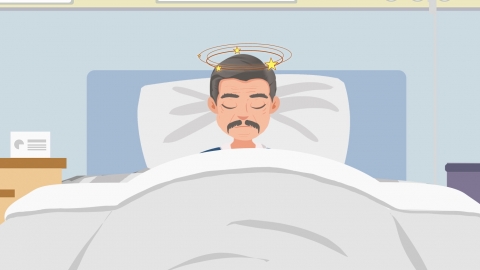What are the causes of sudden fainting in the elderly?
Generally, sudden fainting in the elderly may be caused by overexertion, dehydration, orthostatic hypotension, hypoglycemia, arrhythmia, or other factors. Symptomatic treatments such as general care and medication may be needed. If discomfort occurs, it is recommended to seek medical attention promptly and receive appropriate treatment under a doctor's guidance. Detailed explanations are as follows:

1. Overexertion
Long-term engagement in heavy physical labor may lead to excessive energy consumption, affecting the normal function of the nervous system and causing excessive fatigue. Symptoms such as dizziness and muscle soreness may occur, and severe cases may lead to fainting. It is recommended to have the elderly person lie down immediately to rest and replenish energy and fluids to relieve symptoms.
2. Dehydration
Older adults are prone to dehydration due to insufficient water intake, excessive urination, and other reasons. Dehydration increases blood viscosity, reduces circulating blood volume, decreases cardiac output, and leads to inadequate cerebral perfusion. Symptoms often include thirst, reduced urine output with dark color, and decreased skin elasticity. It is recommended to increase fluid intake and appropriately replenish electrolytes.
3. Orthostatic Hypotension
When elderly individuals stand up quickly from a sitting or lying position, blood flows to the lower body, temporarily reducing blood supply to the brain, which may cause fainting. Symptoms may include dizziness upon standing, visual darkening, and sweating. It is recommended to change positions slowly and avoid sudden standing, especially when rising from a lying position.
4. Hypoglycemia
Hypoglycemia mainly results from inadequate food intake or excessive blood sugar reduction. During hypoglycemia, the brain lacks sufficient energy supply, and nerve function is affected, making fainting more likely. Symptoms often include hunger, sweating, and trembling. It is recommended to use medications such as glucose sodium chloride injection, hydrocortisone tablets, and mannitol injection as directed by a physician to alleviate symptoms.
5. Arrhythmia
Abnormal cardiac electrophysiology or cardiovascular diseases may cause arrhythmia. Arrhythmias such as ventricular tachycardia or atrioventricular block can impair the heart's ability to pump blood effectively, leading to a sudden decrease in cerebral blood flow and resulting in fainting. Symptoms may also include palpitations, chest tightness, and difficulty breathing. It is recommended to take medications such as quinidine sulfate tablets, procainamide hydrochloride tablets, and verapamil hydrochloride tablets under a doctor's guidance for treatment.
It is recommended that elderly individuals develop good daily habits, maintain regular作息 (作息 should be replaced with appropriate English term like "作息 schedule" or "routine"), and engage in appropriate physical activity to help improve overall physical fitness.






